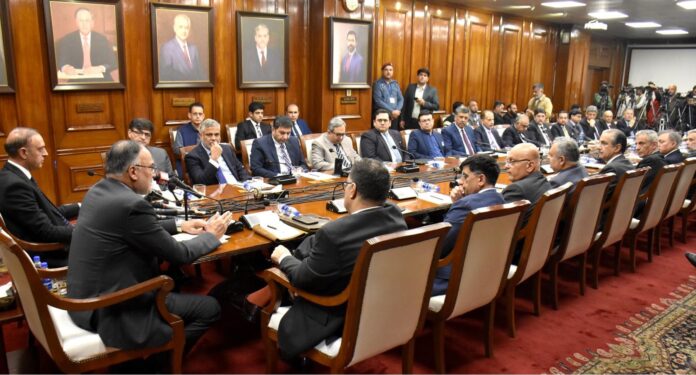Federal Minister for Planning, Development, and Special Initiatives Ahsan Iqbal presented a comprehensive economic roadmap under the Uraan Pakistan initiative, aiming to boost exports to $60 billion. Speaking at a meeting with commercial bank presidents at the State Bank of Pakistan (SBP) headquarters, Iqbal emphasized the transformative potential of the initiative for Pakistan’s economic growth.
The minister, accompanied by SBP Governor Jameel Ahmad and senior banking officials, highlighted the critical role of financial institutions in achieving the initiative’s ambitious targets. He urged banks to increase lending to private and priority sectors, particularly small and medium enterprises (SMEs), which he identified as key contributors to the country’s export potential.
“Uraan Pakistan is more than a program—it’s a vision for a progressive and prosperous Pakistan,” Iqbal stated. He called for collective action and innovation from commercial banks to empower SMEs, support emerging industries, and ensure economic resilience.
Iqbal underscored the importance of diversifying exports beyond traditional textiles, focusing instead on IT, agriculture, mining, manpower export, the blue economy, and cultural industries. He noted that Pakistan’s SMEs, with adequate support, could contribute $40 to $60 billion in exports over the next five years.
Reflecting on Pakistan’s economic history, the minister remarked, “We have experienced three significant economic takeoff attempts, all derailed by wars, political instability, or policy shifts. Uraan Pakistan is our opportunity to rewrite that history with a sustainable and forward-looking approach.”
He also highlighted the government’s focus on the “Five Es”—E-Pakistan, Environment, Energy, Equity, and Economy—as the foundation of the country’s development strategy. Iqbal called on banks to double export credit disbursements, introduce risk mitigation tools, and adopt digital trade finance solutions to empower exporters and reduce transaction timelines.
Acknowledging challenges like political instability, low literacy rates, and rising energy costs, the minister expressed optimism about the future. He concluded by reiterating the vital role of the financial sector, saying, “Banks are the backbone of our economy, and their proactive participation is essential for achieving sustainable growth.”




